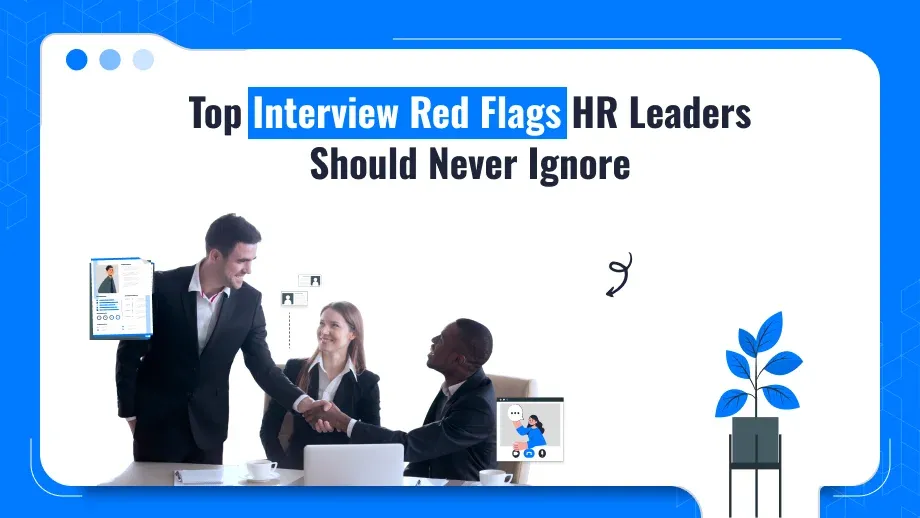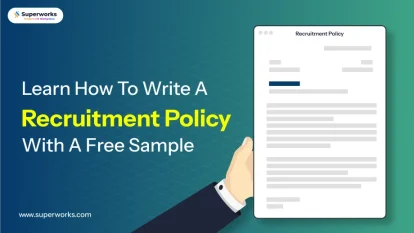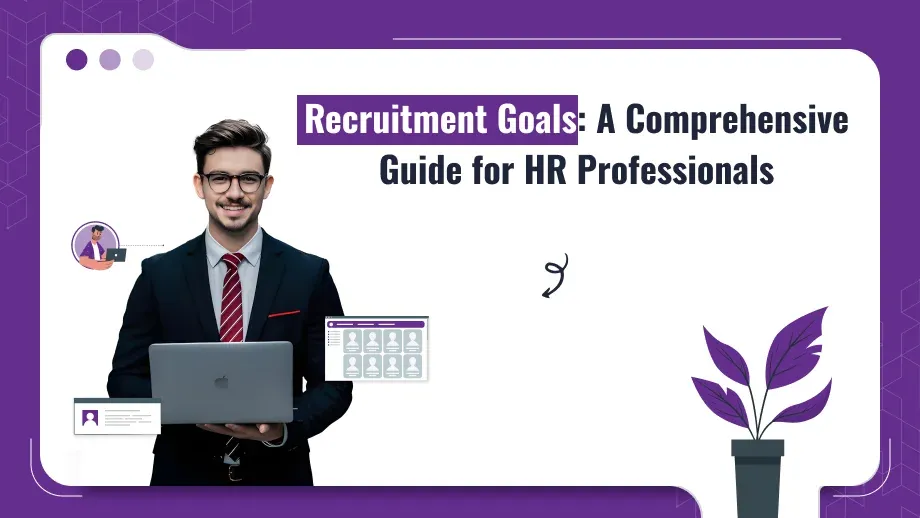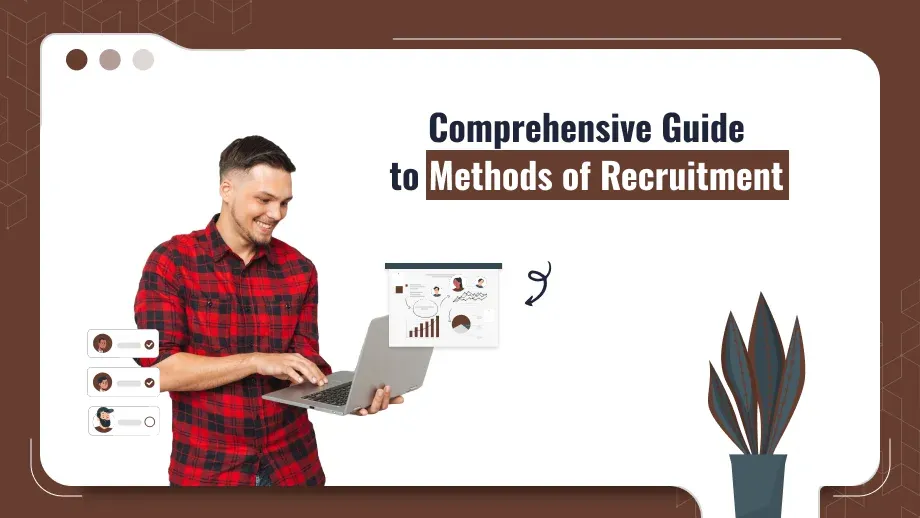Some key interview red flags include lack of preparation, vague or inconsistent answers, bad-mouthing previous employers, and overly rehearsed responses. Identifying these early can prevent costly hiring mistakes.
Grab a chance to avail 6 Months of Performance Module for FREE
Book a free demo session & learn more about it!
-
Will customized solution for your needs
-
Empowering users with user-friendly features
-
Driving success across diverse industries, everywhere.
Grab a chance to avail 6 Months of Performance Module for FREE
Book a free demo session & learn more about it!
Superworks
Modern HR Workplace
Your Partner in the entire Employee Life Cycle
From recruitment to retirement manage every stage of employee lifecycle with ease.


Seamless onboarding & offboarding
Automated compliance & payroll
Track performance & engagement
Top Interview Red Flags HR Leaders Should Never Ignore
- signs of a good interview
- 9 min read
- October 2, 2024

In today’s world hiring the right person is key to any business’s success and stability. Knowing the interview red flags during the hiring process can be a lifesaver. If you overlook these red flags you’ll make costly hiring mistakes that will waste time and money and affect team dynamics and company culture. Hiring someone who doesn’t fit the company values or the job description will disrupt the workflow and high turnover rates are bad for the long-term health of the business.
To avoid these risks HR professionals should use structured interview techniques in HRM that cover both hard and soft skills. These will assist in identifying hidden behavioral issues and spotting interview red flags such as inconsistent answers, lack of preparation, or poor interpersonal skills. To ensure that the interview process runs smoothly and that everyone is prepared, clear Interview Call Letters and Interview Reminder Letters should be sent to candidates for the conversation ahead.
- 10 Interview Warning Signs That HR Directors Should Recognize
- 1. Unprepared
- 2. Vague or Inconsistent Answers
- 3. Bad Mouthing Previous Employers
- 4. Bringing up Compensation too early
- 5. Lack of Enthusiasm or Body Language
- 6. Impractical Expectations or an Inability to Accept Critique
- 7. Job Hopping or No Career Progression
- 8. Reserved Reactions to Inquiries concerning Conduct
- 9. No Questions from the Candidate
- 10. Too Critical of Industry Standards
- Hidden Interview Red Flags: Red Flags HR Shouldn’t Ignore
- Managing Warnings in the Meeting: Testing Further
- Beyond the Interview: Managing the Whole Recruitment Process
- Conclusion
10 Interview Warning Signs That HR Directors Should Recognize
1. Unprepared
Generally, the first warning indication of a candidate’s under-preparedness should be his or her first warning in an interview. The little understanding that the applicants tend to show regarding the company and role they are searching for immediately raises concerns about how interested these applicants may be in your company. Any candidate who has taken the time and effort to research and prepare would be likely to display some excitement in that role and state how their skills align with the company’s needs. This is a concern that applicants who are not focused on their education may not be serious about the role, creating doubts about commitment and compatibility with the organization.
2. Vague or Inconsistent Answers
Giving evasive or contradictory answers in an interview red flags is another cause for concern. A candidate may be dishonest or incompetent if they are unable to provide concrete examples from their job history or to respond to interview questions for overqualified applicants. Efficient and pertinent responses are essential for evaluating a candidate’s suitability for the position and their qualifications. The conflicting story between their resume and interview warnings reactions ought to be researched further as it might mean further issues.
3. Bad Mouthing Previous Employers
During the interview, candidates who disparage their previous employers are a big red flag. This behavior shows a lack of professionalism and may mean they didn’t take responsibility for their past experiences. A negative attitude toward previous employers may also indicate potential issues with the new organization’s team dynamics and culture. HR professionals should look for candidates who are professional and respectful of past experiences no matter what.
4. Bringing up Compensation too early
Candidates who bring up pay too early in the interview process indicate a lack of interest in the goals and core values of the organization. Although pay is a factor, a qualified applicant will typically concentrate on how they may advance in the position and benefit the company. Because it may indicate that the applicant is not truly committed to the position or the objectives of the organization, HR directors should take this as a warning sign. While understanding tools like HRMS Payroll Software in India can assist in wage management, the primary objective ought to be to locate individuals with a strong work ethic.
5. Lack of Enthusiasm or Body Language
In an interview red flags, small signs like lack of energy or poor body posture can be important warnings. Candidates who don’t engage or seem uninterested may not be as dedicated to the job or the company as needed. HR directors ought to go beyond candidates’ spoken responses and evaluate their nonverbal cues, as these might reveal how they feel about the position. Ignoring a lack of enthusiasm is a major warning sign.
6. Impractical Expectations or an Inability to Accept Critique
During the interview process, candidates who exhibit unreasonable expectations for the role or become defensive when provided feedback could cause future problems. These applicants could find it difficult to fit into the role’s requirements or the corporate culture. HR specialists should evaluate the applicant’s ability to accept constructive criticism and determine whether or not they have a practical grasp of the demands of the position. This is a serious warning sign that may affect team relationships and long-term performance.
7. Job Hopping or No Career Progression
For HR professionals, frequent job changes without a good reason might be a sign of instability and can raise concerns. Even while job moves may have legitimate causes, applicants who are unable to articulate a reasonable career development may come across as untrustworthy. This warning sign may indicate a lack of commitment and may question the candidate’s long-term viability for the organization. A candidate must show that he is aware of his or her career path and how it connects with the position he or she is applying for.
8. Reserved Reactions to Inquiries concerning Conduct
Applicants who become shifty or guarded while addressing social inquiries might mean they are awkward with their previous encounters. This could indicate a lack of self-awareness or accountability issues. If up-and-comers can’t make sense of how they have taken care of difficulties or mishaps it might mean they miss the mark on flexibility expected in a high-speed workplace.
9. No Questions from the Candidate
A candidate may not be fully invested in the process if they do not inquire about the role, team, or company culture. This lack of inquiry may indicate that the candidate hasn’t taken the interview red flags seriously or doesn’t care about how they fit in the company. Good candidates usually have thoughtful questions that show their preparation and interest.
10. Too Critical of Industry Standards
Candidates who criticize industry practices or trends without offering solutions may mean a lack of collaboration and adaptability. Negative attitudes can lead to problems in teams that need open-mindedness and adaptability. Candidates need to express their viewpoints while remaining respectful and focused on finding solutions.
Hiring the Right Fit? Watch Out for These Red Flags!
Avoid hiring pitfalls by understanding the most common interview red flags. Click here to get started!
Hidden Interview Red Flags: Red Flags HR Shouldn’t Ignore
1. Overly Rehearsed Answers
Although candidates ought to be well-prepared for the interview, excessively prepared responses may raise suspicions. It may be a sign that candidates are concealing their genuine selves or skill sets when they respond in a way that sounds forced or overly polished. To counter this HR professionals should adjust their interview technique in HRM to ask follow-up questions that require critical thinking and spontaneity. This will help uncover the real capabilities and fit of the candidate.
2. Lack of Cultural Fit
Hiring choices are greatly influenced by how well candidates align with the company’s culture. When candidates don’t fit in with this culture, it can signal potential issues. If a candidate struggles to connect with the organization’s way of working, they may find it hard to contribute effectively. During the interview red flags process, HR professionals should give special attention to evaluating the candidate’s values and motivations to spot possible misfits early.
3. Resume and interview inconsistencies
Any discrepancies between the applicant’s résumé and interview responses ought to raise suspicions. If the information is inconsistent, it may indicate embellishment or a communication breakdown. To guarantee a correct evaluation of the candidate’s fit, HR directors should be meticulous in their assessment and think regarding requesting clarification on any discrepancies.
4. Evasive Answers to Gaps in Employment
Candidates who evade questions about gaps in their employment history should be a cause for concern. This evasion may indicate deeper issues that could affect performance and dependability. HR experts ought to be ready to ask tenderly yet solidly to get more data on these holes and the purposes for them.
Managing Warnings in the Meeting: Testing Further
1. Follow Up Questions
When warning signs appear during an interview red flags, HR experts should not be reluctant to inquire further to allow the applicant an opportunity to explain any discrepancies. For instance, when encountering overqualified applicants, it’s beneficial to question them about their interest in a position that appears to be beneath their abilities. This approach provides an understanding of their reasons and aids HR managers in assessing whether the applicant is genuinely interested in the position or merely seeking any available job.
2. Instinct vs Fairness
Red flags are key signs to watch for, but HR leaders need to balance their instincts with fairness and objectivity. Personal biases can cloud your judgment when deciding if a candidate is suitable. Creating a clear and consistent process for identifying interview red flags can help you stay objective and make better hiring choices.
3. No-Shows
Addressing the no-shows is critical as it can mean a lack of reliability. To reduce the number of no-shows, HR professionals should use Interview Reminder Letters and follow proper interview scheduling procedures. Candidates’ commitment to the interview red flags procedure will be bolstered and these instances will be minimized by consistent communication.
Beyond the Interview: Managing the Whole Recruitment Process
1. Applicant Tracking Systems
Application tracking systems are useful tools that can make the hiring process easier. They speed up the process of selecting the best candidates. ATS can streamline interviews, track interview red flags across multiple stages, and help with better hiring decisions. HR teams can concentrate more on finding the best candidates for their organization by automating routine tasks and ensuring consistency in candidate evaluations.
2. Follow Up After the Interview
Follow-up is key. Sending interview invitations and reminders shows professionalism during the hiring process. These messages help set candidate expectations and demonstrate the organization’s dedication to a positive experience, which is essential for attracting the best talent.
3. Exit Interviews and Lessons for Future Hires
Carefully written Exit Interview Letters can provide helpful information about the hiring process and points that need improvement. Understanding why employees leave can help you spot issues in your recruitment strategy and make necessary changes. Taking this proactive step can prevent future hiring errors and lead to a more effective recruitment process.
Conclusion
In summary, recognizing and dealing with warning signs during interview red flags is essential for HR professionals. By combining a clear process with intuition, HR leaders can improve their hiring choices. Perhaps the most important is having a hiring system that reduces the risks involved and promotes truthfulness to help you get the right fit for your company culture. Tools such as HRMS Payroll Software in India and Applicant Tracking Systems can bring a smoother, more accurate, and more effective hiring process-that again, which is eventually beneficial to your organization.
FAQs
What are interview red flags to look for in a candidate?
How can I handle candidates not showing up for interviews?
Ensure clear Interview Scheduling and follow up with Interview Reminder Letters. If candidates frequently no-show, consider tightening communication and assessing reliability in earlier stages of the process.
What are signs of a good interview?
A good interview often includes clear, concise answers, demonstrated enthusiasm, strong cultural alignment, and the candidate’s ability to ask thoughtful questions. These signs show the candidate’s preparedness and genuine interest.
How should I approach interview questions for overqualified candidates?
Focus on understanding their motivation for applying, their willingness to take on the role, and how they align with the company's long-term goals. Make sure to address their potential fit with the team.
How can Applicant Tracking Systems improve my hiring process?
Applicant Tracking Systems help streamline recruitment, making it easier to track applicants, identify interview red flags, and ensure proper communication throughout the process.


